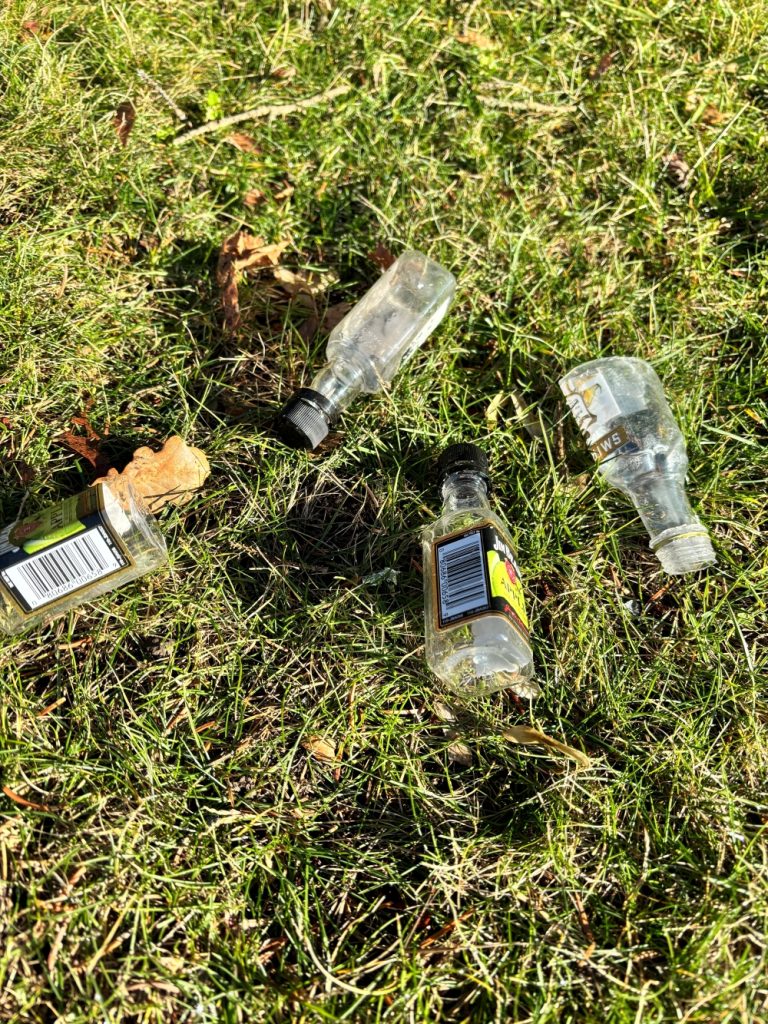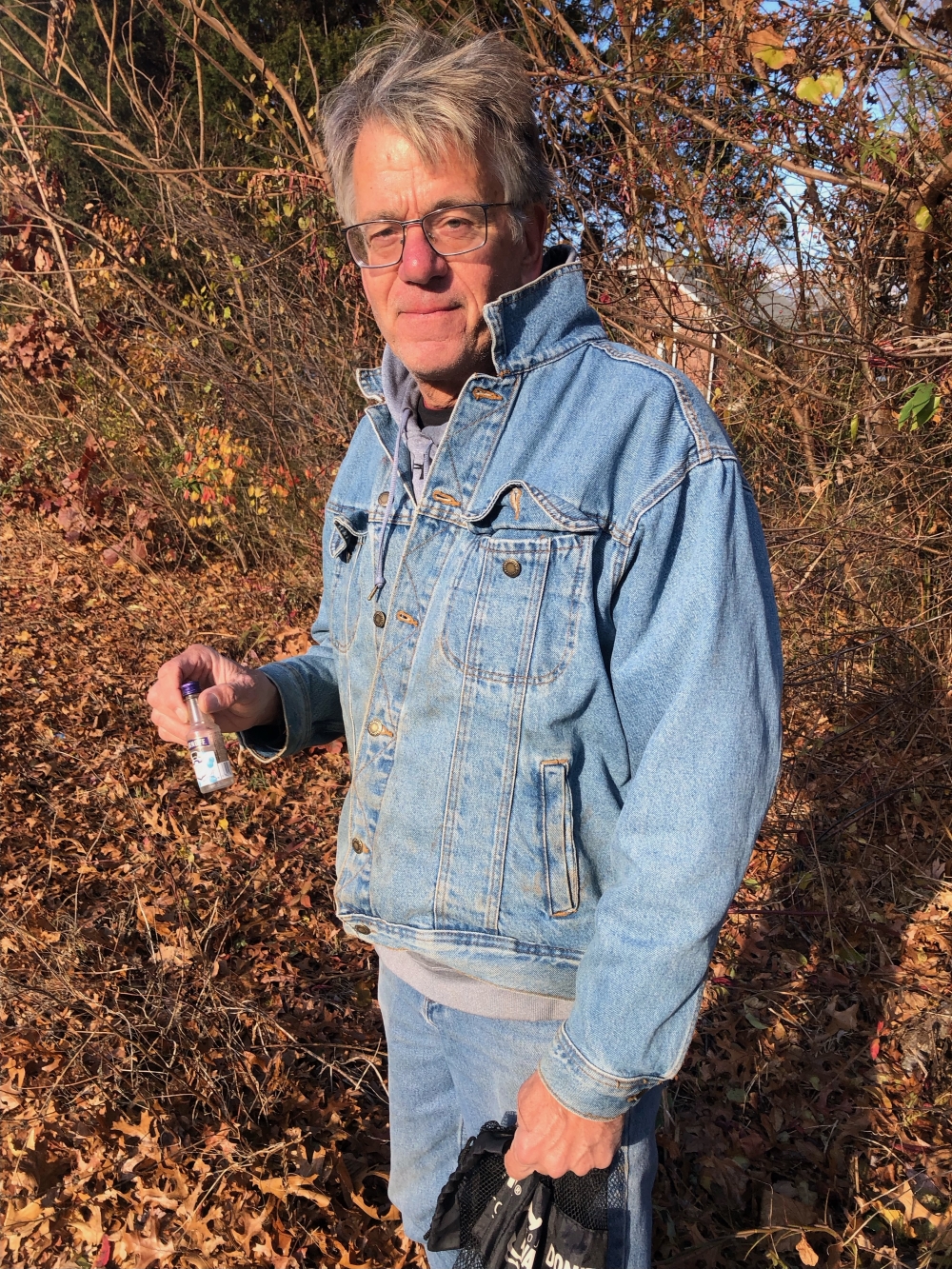It’s a typical day for Paul Tosi – he’s picking up discarded plastic nips, this time along Court Street.
Tosi, a runner for years, had often seen the tiny plastic liquor bottles – 100 ml or less – along the side of roads on his route, but he didn’t give them much thought. Then on a run one Sunday morning, it dawned on him that there were more of them than ever – all over the sidewalk on Main Street. He decided to pick them up.
He’s been doing that ever since and is now part of a coalition that pushed successfully for a ban on sale of nips in Plymouth. But the victory at the Oct. 21 Town Meeting was a narrow one – the ban passed by just five votes, with 72 in favor, 67 against, and 2 abstentions.
Now, another coalition, led by liquor store owners, is leading a campaign to overturn the ban at a special referendum election scheduled for Saturday, Jan. 13.
A “yes” vote would uphold the ban passed by Town Meeting. It would become effective July 1, 2024. A “no” vote would allow the sale of nips to continue.
Town Clerk Kelly McElreath said she does not have an estimate of how much the special election will cost. The last town election, in May, cost $57,000, she said. McElreath predicted this one would run somewhat less because there is just one question on the ballot, which means less time is needed to count the votes.

Ken Stone, who helped organize the campaign for the nip ban, said that in May he and other volunteers picked up more than 14,000 nip bottles from the sidewalks, roadsides, parking lots, and unattended properties of Plymouth.
“We see what’s out there,” Stone said.
Stone believes banning their sale can be effective in reducing litter, pointing to Falmouth’s experience.
In 2018 and 2019, the Falmouth Litter Reduction Team found that nips constituted 32 percent of 20 roadside litter counts conducted by the organization, according to Alan Robinson, one its co-founders. In 2021, Falmouth approved a ban on the sale of nips. This year, Robinson said, they accounted for only 6 percent of litter in six roadside counts.
“Nip litter has virtually disappeared in Falmouth,” Robinson said.
Plymouth, the state’s largest municipality geographically, has 16 all-alcohol stores that sell nips. (There are also seven businesses with wine and malt licensees, but they are not allowed to sell nips.)
Peter Balboni, owner of Pioppi’s Liquors on Court Street, is leading the push to overturn the ban.
Balboni has proposed alternative approaches to the litter problem: expand the bottle bill to include nips, as Maine has, or impose an environmental fee on nips, with funds distributed to towns where they are sold, as Connecticut has done.
Balboni said that a nip ban would hurt business at Plymouth liquor stores.
“It’s ridiculous,” Balboni said. “You’re just sending away business to surrounding towns.”
Of the towns neighboring Plymouth, only one, Wareham, has a nip ban. Kingston, Carver, and Bourne do not.
If customers go to other towns to buy their nips, Balboni said, Plymouth liquor stores could lose up to 30 percent of their business. Balboni did not offer any data to back up that claim, but cited testimony by Robert Mellion, executive director of the Massachusetts Package Stores Association, in front of the New Bedford Licensing Board earlier this year. During that testimony, Mellion said that after Chelsea implemented a nip ban in 2016, revenues at Chelsea liquor stores “plummeted” while sales increased 64 percent in East Boston, 26 percent in Revere, and 14 percent in Everett.
“They come in to buy a nip, but they might buy a newspaper, a lottery ticket, their cigarettes,” Balboni said of those who favor consuming alcohol in single-serve containers.
Balboni predicted that if deprived of nips, customers who do not drive to another town would buy the next biggest size of hard liquor, half pints, more than four times larger than the average nip bottle, implying that problem drinkers would consume more based on the size of the container.
“If you force an alcoholic to buy a larger bottle, they’re going to drink the larger bottle,” Balboni said. He did not offer data to back up his assertion that a person’s alcohol consumption is based on the size of a container.
Stone certainly doesn’t buy that argument. “Why didn’t that happen in Chelsea?” he said, referring to that city’s nip ban, which went into effect in 2016.
Chelsea, the first city in Massachusetts to impose a nip ban, found that alcohol-related calls to emergency services diminished from 720 in 2015 to 496 in 2017, said Chelsea city councilor Roy Avellaneda. He cited it as evidence that a nip ban diminished problem drinking.
The deadline to register to vote in the special nip ban election is Jan. 3.
On Jan. 11, at 6 p.m., the citizens group PlymouthFirst will hold a moderated debate on the issue at the town hall. Organizers say the timed debate will include written questions from the audience.
On the day of the vote, Jan. 13, polls will be open from 7 a.m. to 7 p.m.
Fred Thys can be reached at fred@plymouthindependent.org.

